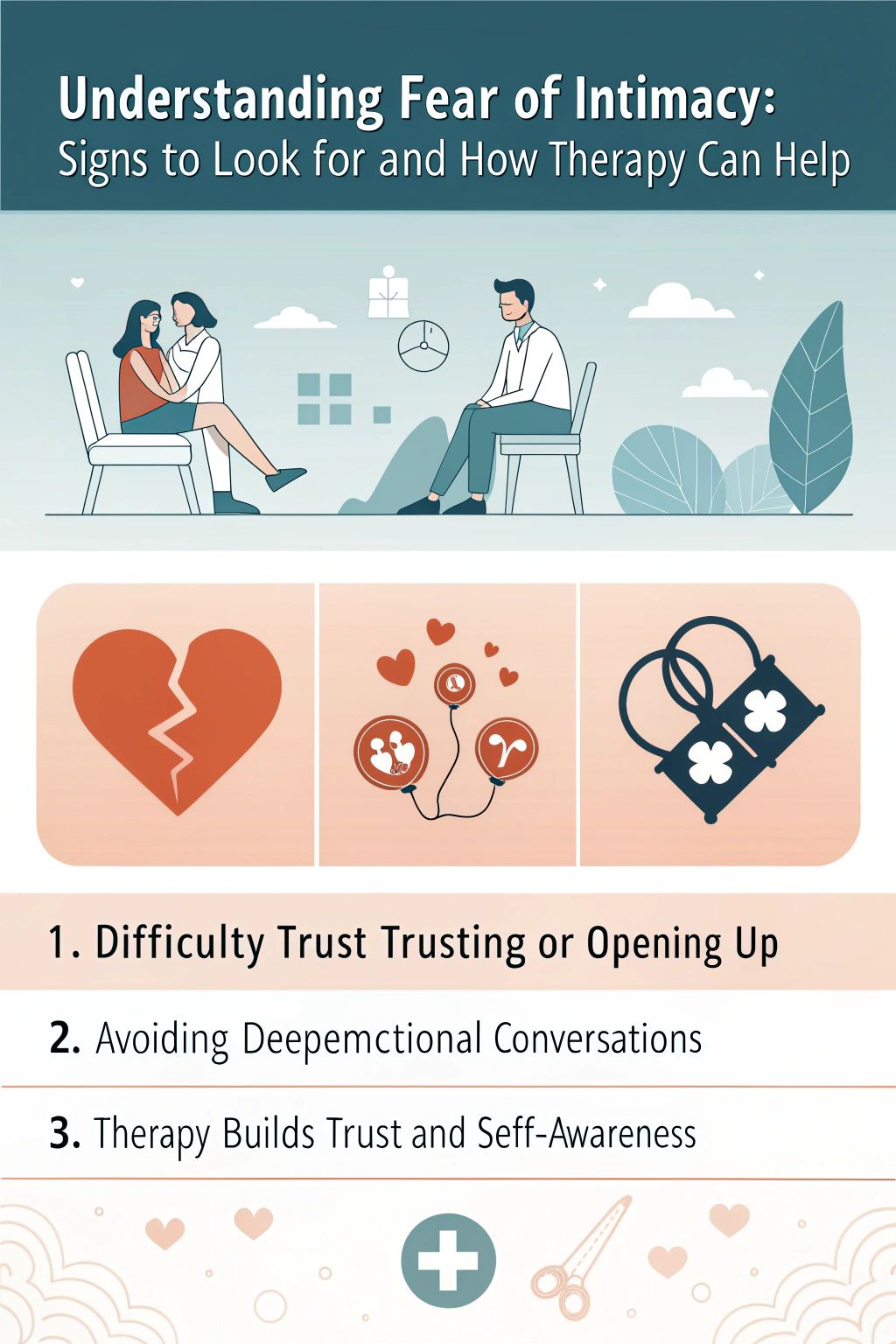Many people long for close relationships but find themselves pulling away. This struggle often signals a fear of intimacy. It’s a common issue, making one crave connections while also fearing them.
Fear of intimacy can stop us from forming deep bonds with others.
One key fact is that fear of intimacy isn’t just about being scared to get physically close; it includes emotional and intellectual closeness too. In this blog, we’ll look at the signs of this fear and how therapy could offer help.
Therapists work to understand individual experiences, offering tools and guidance for overcoming these fears.
Keep reading to learn more about freeing yourself from the fear holding you back.

What Is Fear of Intimacy?

Fear of intimacy is a condition where people feel scared to share close emotional or physical connections. This fear can affect various types of relationships, including romantic, family, and friendships.
People with this issue often want to be close to others but find themselves pushing people away. They struggle with different forms of intimacy like emotional, intellectual, and even sexual closeness.
The root of this problem often lies in deep-seated fears such as the fear of abandonment or engulfment.
These core fears may stem from childhood experiences or trauma. For instance, someone who faced neglect or abuse might develop an avoidant attachment style. This makes it hard for them to trust others and open up emotionally.
Social phobia or social anxiety disorder also link closely to fears around being intimate with others. These conditions make individuals extremely uncomfortable at the thought of getting too close to someone else for fear of judgment or rejection.
Signs of Fear of Intimacy
People with a fear of intimacy often experience difficulty trusting others and may avoid emotional closeness. They might also sabotage relationships and feel discomfort with physical affection, which are common signs to watch for.
Difficulty trusting others
Difficulty in trusting others marks a significant challenge for those with a fear of intimacy. This issue roots deeply in past experiences, such as childhood traumas or betrayals by caregivers.
These early negative interactions can lead an individual to guard themselves against future hurts, making it hard to form close and trusting relationships. People who struggle with this often find themselves in a cycle of short-term relationships or avoid getting emotionally close to anyone at all.
42% of people report feeling depressed due to loneliness, showing how widespread the issue is. Therapy offers tools like cognitive behavioural therapy (CBT) and couples therapy, aiming to rebuild trust by addressing these underlying issues. It focuses on understanding one’s patterns and developing healthier ways of relating to others, ensuring emotional closeness doesn’t feel like a threat but rather an opportunity for connection and growth.
Avoidance of emotional closeness
People with a fear of intimacy often pull back from getting too close to others. They change the subject when conversations get personal or find reasons not to spend time together.
This behaviour stems from a deep worry about being vulnerable. Fear drives them to keep their distance, protecting themselves from potential hurt or disappointment.
These individuals might avoid sharing their feelings, thoughts, and everyday experiences with partners or friends. Holding hands or hugging becomes hard for them because physical closeness feels unsafe.
It’s like they have an invisible wall that stops anyone from getting truly close. Their actions are defensive tactics against the risk of emotional pain.
Sabotaging relationships
Some individuals push away those they care for as they get closer. They may pick fights or criticise to seem unlovable. These actions are signs of sabotaging relationships. A person might avoid deep talks to keep intimacy at bay.
Core fears like being left alone or feeling too controlled can lead to these sabotaging acts. This behaviour stems from a fear of getting too close or losing one’s self in a relationship.
Therapy can help address these fears by teaching coping strategies and helping build healthier bonds.
Discomfort with physical affection
People often feel uneasy with physical touch when they have a fear of intimacy. This reaction is not just about disliking hugs or other close contact. It’s a symptom of deeper issues like childhood trauma, fear of abandonment, or even low self-esteem.
Survivors of traumatic events might find uninvited touches trigger intense fear responses.
Therapeutic interventions offer a path through which individuals can learn to understand and manage their discomfort with physical affection.
In therapy, patients work on building awareness around their fears and learning how to form healthier relationships. Cognitive behavioral therapy, in particular, helps by changing the negative thoughts that contribute to their fear.
Through this guided support, individuals start feeling more comfortable around others, paving the way for improved personal connections.
Common Causes of Fear of Intimacy
Fear of intimacy can stem from various factors such as childhood trauma, fear of abandonment or engulfment, and low self-esteem. Past experiences with caregivers may also contribute to the development of this fear.
Childhood trauma
Childhood trauma deeply affects a person’s ability to form intimate relationships. Experiences like abuse can change the amygdala and hippocampus in the brain. These changes may cause strong reactions to triggers later in life.
Many people who went through such trauma find it hard to trust others. They might feel very scared or uneasy with physical closeness.
Therapy aims to help by rebuilding trust and reducing anxiety through non-sexual forms of closeness. For survivors, this process is key in managing their fear of intimacy. It allows them to connect with others without feeling overwhelmed by past experiences.
Fear of abandonment or engulfment
People often feel scared they will lose their relationships. This fear comes from bad experiences in early life with family or caregivers who did not provide secure bonds. They start needing too much reassurance or becoming obsessed with the thought of being left alone.
On the other side, some worry about getting too close to others. They fear losing freedom and feeling trapped, which leads them to keep an emotional distance from partners. Both fears result in harmful actions that damage chances for real connections.
Addressing these fears takes patience and support from both sides in a relationship. Psychotherapy offers ways to work through these issues by looking into past traumas and building healthy communication skills.
It helps people understand why they act out of fear and teaches them how to form closer bonds without feeling overwhelmed or abandoned.
Low self-esteem
Addressing low self-esteem is vital for fostering healthy intimate relationships and promoting overall well-being. Low self-esteem can hinder the formation of deep emotional connections and lead individuals to struggle with intimacy and trust in relationships.
Research has indicated that low self-esteem is linked to an increased fear of intimacy among emerging adults. Furthermore, studies have revealed that 42% of people report feeling depressed due to loneliness, connecting feelings of inadequacy and low self-worth to mental health challenges.
Additionally, perfectionism may exacerbate these issues by creating excessive self-expectations, impacting trust in oneself and others.
How Therapy Can Help with Fear of Intimacy
Therapy can aid in understanding and addressing the root causes of fear of intimacy, such as childhood trauma, fostering self-awareness and promoting healthier communication skills.
It also provides a supportive environment for individuals to work through their fears and develop strategies to build trust and emotional closeness in relationships.
Building self-awareness
Understanding the root causes of fear of intimacy requires developing self-awareness. This involves deep introspection and reflection on past experiences to recognise how they may have influenced one’s perception of relationships.
It also entails acknowledging and exploring personal vulnerabilities and emotional triggers that contribute to feelings of discomfort with intimacy. Developing self-awareness empowers individuals to identify patterns in their behaviour and emotions, helping them understand how these patterns impact their ability to form close connections with others.
By actively engaging in this process, individuals can begin to recognise how their early attachment experiences or past traumas shape their apprehensions about intimacy. Self-awareness enables them to gain insight into their fears, which is a crucial first step towards addressing and overcoming them in therapy.
Furthermore, it equips individuals with the understanding needed to adopt effective coping strategies when faced with challenging interpersonal situations related to intimacy.
Addressing past trauma
Therapy for addressing past trauma involves guiding individuals to recognise and process their emotional responses related to traumatic events. It encourages understanding how past experiences impact present behaviours and relationships.
Techniques used in therapy, such as cognitive-behavioural therapy or trauma-focused therapy, aim to help individuals reframe distorted beliefs about themselves and others arising from the trauma.
This approach also emphasises practising healthy coping strategies when triggered by intimacy-related emotions, thereby fostering a sense of safety and security in one’s close relationships.
A key aspect of addressing past trauma includes learning to regulate emotional distress triggered by intimate situations. Therapeutic interventions focus on helping individuals build resilience and develop healthier attachment styles through rebuilding trust and processing unresolved feelings related to the past traumatic experiences.
By utilising techniques like mindfulness practices or sensory-based interventions, clients can gradually learn to manage overwhelming emotions associated with intimacy while promoting a sense of connection and emotional well-being.
Learning healthy communication skills
Learning healthy communication skills is vital for building and maintaining strong relationships. Effective communication involves expressing thoughts, feelings, and needs clearly while also actively listening to others.
By honing these skills, individuals can navigate conflicts more constructively and foster deeper connections with those around them.
Therapy can provide a supportive environment for learning and practising healthy communication techniques. Role-playing scenarios in therapy sessions can help individuals build confidence in articulating their emotions and boundaries while also developing the ability to empathise with others’ perspectives.
Furthermore, therapy offers practical guidance on setting and communicating boundaries, which is vital for establishing mutual respect within interpersonal relationships. The process of acquiring healthy communication skills through therapy empowers individuals to express themselves authentically while fostering understanding and empathy in their interactions with others.
Conclusion
Understanding fear of intimacy is essential for acknowledging and addressing its impact on relationships. By identifying signs such as difficulty trusting others, avoidance of emotional closeness, and relationship-challenging actions, individuals can take proactive steps to seek therapy.
Professional therapy offers a valuable opportunity to build self-awareness, address past trauma, and develop healthy communication skills essential for overcoming fear of intimacy.
With the right guidance and effort, individuals can acquire the necessary tools to cultivate long-lasting intimate connections.
References
- https://www.verywellmind.com/fear-of-intimacy-2671818 (2024-01-12)
- https://www.webmd.com/sex-relationships/signs-fear-intimacy
- https://www.talkspace.com/blog/fear-of-intimacy/
- https://cptsdfoundation.org/2019/04/19/overcoming-the-fear-of-intimacy/ (2019-04-19)
- https://anchorlighttherapy.com/fear-of-abandonment-vs-engulfment/
- https://www.relationshipspb.com/all-blog/fear-of-abandonment-vs-fear-of-engulfment
- https://www.researchgate.net/publication/374969162_Self_Esteem_and_Fear_of_Intimacy_in_Emerging_Adult_with_Divorced_Parents
- https://www.harleytherapy.co.uk/fear-of-intimacy-help-guide.htm (2023-03-21)
- https://www.healthline.com/health/fear-of-intimacy (2019-01-10)
MindOwl Founder – My own struggles in life have led me to this path of understanding the human condition. I graduated with a bachelor’s degree in philosophy before completing a master’s degree in psychology at Regent’s University London. I then completed a postgraduate diploma in philosophical counselling before being trained in ACT (Acceptance and commitment therapy).
I’ve spent the last eight years studying the encounter of meditative practices with modern psychology.

